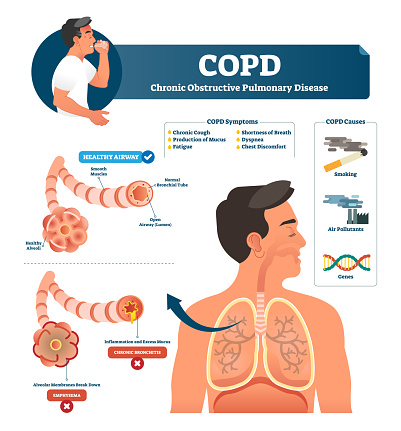
Chronic Obstructive Pulmonary Disease (COPD) is a disease that comes with difficulty in breathing. There are two main types – emphysema and chronic bronchitis. Kalpana Desai, MD explains that chronic bronchitis results in increased mucus and swelling in your airways. The swelling narrows the airways making it difficult to push air through them. On the other hand, emphysema damages the air sacs inside your lungs, trapping air in the lungs resulting in shortness of breath.
COPD can get worse with time and become severe, making it difficult to perform basic tasks like walking, doing light housework, dressing, and washing.
Symptoms of COPD
The symptoms include:
- Difficult taking a deep breath
- Long-lasting cough
- Shortness of breath, mostly during physical activity
- Tightness in your chest
- A cough coming with mucus
The symptoms get worse over time if the condition goes undiagnosed. Early treatment is necessary as delayed treatment can bring complications like heart problems, respiratory infections, and high blood pressure. The infections can damage your lungs further.
What Causes COPD?
COPD is primarily caused by damage to your lungs. The damage can occur due to breathing in pollutants or unhealthy substances over time. Examples include;
- Gases
- Mists
- Air pollutants
- Vapors
- Chemical fumes
- Dust
- Tobacco smoke
The biggest cause is smoking and secondhand smoke. Long-term exposure to these substances irritates your lungs. Some people have a rare genetic condition causing COPD even when they haven’t been exposed to irritants.
COPD Diagnosis
It’s recommended that you go for general screening if you show symptoms of COPD. The specialists perform an exam and inquire about your medical history and symptoms. They also listen to your breathing. A spirometry test determines if you have heart failure, asthma, or COPD.
Treatment of COPD
Early diagnosis is vital, as death can be prevented if the condition is treated early. Treatment includes:
Medicines
The doctor prescribes medications that ease the COPD symptoms and enable you to breathe well. Medications include oral antibiotics, bronchodilators, and inhaled steroids. The medications control inflammations in the lungs, relax muscles surrounding the airway and to treat the infections.
Lifestyle Changes
You need to stop smoking, including cigarettes, cigars, and e-cigarettes.
Vaccines
You can be administered certain vaccines that prevent respiratory infections like pneumonia and flu which can cause problems if you have COPD.
Oxygen Therapy
You can be administered oxygen to help you breathe. For instance, you can wear a mask or nasal prongs as advised by the specialist.
Pulmonary Rehabilitation
Pulmonary rehabilitation helps manage the disease and it improves the quality of your life. The specialists create a plan that includes exercise and a diet program to help you feel better. Also, they incorporate breathing strategies to conserve your energy.
Surgery
Surgery involves lung reduction procedures or a lung transplant. This treatment is used as a last resort.
Effective COPD Management Practices
Effective COPD Management Practices
Treatment is a shared responsibility involving the patient and your primary care provider from diagnosis to treatment. An effective management strategy relies on a doctor-patient partnership to enhance the treatment outcome.
- Support efforts to stop smoking and change your lifestyle behaviors
- Provide routine monitoring such as spirometry to address symptoms, manage risks, and assess ongoing treatments.
- Promote medication adherence by training on correct inhaler technique
Conclusion
Conclusion
About 16 million Americans have COPD, which can make performing simple activities such as walking or climbing stairs difficult. Schedule routine tests if you experience any of the symptoms for early diagnosis and treatment. Specialists focus on treatment to reduce risks of severe COPD that can result in lung damage and death. Consult a medical specialist for proper diagnosis and treatment.






More Stories
Inheritance Loans – What They Are and How They Work
Getting Personal Loans With No Credit Checks: Loan Opportunity For Bad Credit Borrowers
How Do You Obtain An Unorthodox Loan?